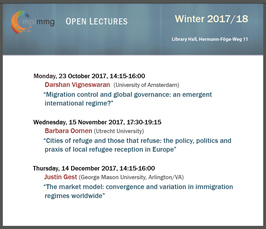"Cities of refuge and those that refuse: the policy, politics and praxis of local refugee reception in Europe"
Open Lectures Winter 2017/18
- Date: Nov 15, 2017
- Time: 05:30 PM - 07:15 PM (Local Time Germany)
- Speaker: Barbara Oomen (Utrecht University)
- Barbara M. Oomen is a professor in the Sociology of Human Rights and the former Dean of UCR.
- Location: MPI-MMG, Hermann-Föge-Weg 11, Göttingen
- Room: Library Hall

For more details please contact buethe(at)mmg.mpg.de.
The recent influx of refugees in Europe has shed unprecedented light on the role of local authorities in their welcome and integration. Part of the explanation for this turn towards the local amongst both policy-makers and academics lies in the political ambivalence towards the topic displayed by many European nations. Another part lies in the rise formal autonomy combined with heightened self-assurance of local and regional authorities in this field. This general introduction sets out the degree to which local authorities throughout Europe have both claimed, and received autonomy in refugee welcome and integration over the past years, considering policies, the underlying politics but also differing local praxis. From a legal and a policy perspective, it is clear to what extent constitutions differ in the space that local and regional authorities have to develop own policies in relevant domains like refugee intake and mobility, housing, education, work and integration and participation. The multi-level context here is also shaped by European and international law and policies, who increasingly directly address and engage with local authorities. In addition, aspects of refugee welcome and integration are increasingly ‘outsourced’ to private or semi-private enterprises, which are highly centralized, or left to local NGOs. This leaves space for a divergence in local policies that, from a political viewpoint, can be considered in two ways: either as the use of ‘disorder as a political instrument’, leaving contentious national issues for local authorities to solve, or as stimulating experimentation and situational policy-making. In considering the praxis of local authorities in this uncertain and ambiguous context, it is clear that some local authorities put themselves forward as ‘cities of refuge’ – often within international networks of like-minded cities – whereas others can be considered ‘cities that refuse’. On the basis of the literature, policy-reports and news sources on this differing praxis throughout Europe it is possible to put forward theories on what variables impact on local refugee welcome, and the degree to which the differences concerned produce, reinforce and mitigate uncertainty.